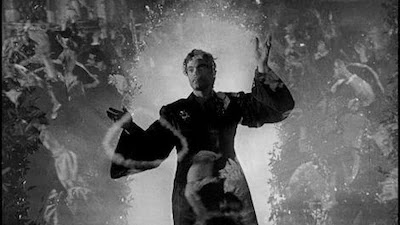 |
| Orson Welles dazzles in Black Magic |
Bo Burnham's Inside was a slight disappointment to me. A response to COVID, the film consists of Burnham singing little ditties inside his abode. The songs are hit and miss, but the main problem with the film is that it is not visually inventive or exciting. Burnham is one of the most talented comics of his generation, but it is hard to make a one character film about anxiety, anomie, and depression without succumbing to solipsism.
Alex Cox's Straight to Hell is a stoopid Leone parody with traces of Peckinpah and Charles Portis. A must see only for Cox completists and midnight movie addicts. I must say the "Director's Cut" is a much better and more coherent film than the one I saw in 1987. For one thing, there are more musical numbers. The cast includes Joe Strummer, Elvis Costello, The Pogues, Grace Jones, Dennis Hopper, Courtney Love, Jim Jarmusch, and Edward Tudor-Pole. Zander Schloss, former bassist for the Circle Jerks, steals what movie there is as a decrepit hot dog vendor. The liquor bill on this shoot must have been enormous. Quentin Tarantino seems to have inspired by the performance of Sy Richardson as "Norwood" in this film to invent the persona of "Jules" for Samuel L. Jackson in Pulp Fiction.
I've touched on the Maryland Censor Board and Mary Avara before. However, I was ignorant of Joe Tropea's Sickies Making Films, a loving and wry history of local censors that focuses on the Free State's board. Recommended to native Marylanders and film buffs.
Jon S. Baird's Filth, from 2013, is an intermittingly successful adaptation of the Irvine Welsh's novel. Baird and the talented cast capture Welsh's scabrous tone, but the protagonist's descent into madness is rendered feebly. Still. the cast is a stellar one: James McAvoy, Jim Broadbent, Imogen Poots, Jamie Bell, Kate Dickey, and Shirley Henderson.
Clive Donner's She Fell Among Thieves, from 1978, is TV mystery movie that is more than adequate light entertainment. Tom Sharpe, who freely adapted the script from Dornford Yates' novel, displays the wit that marked him as the best English comic novelist since Evelyn Waugh. Eileen Atkins steals the show as villainess "Vanity Fair". The costumes and décor are a feast for the eyes. The fine cast includes Malcolm McDowell, Michael Jayston, and Karen Dotrice.





No comments:
Post a Comment